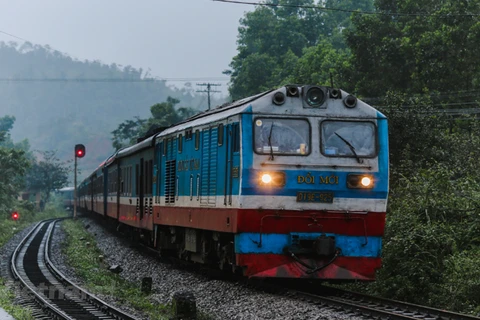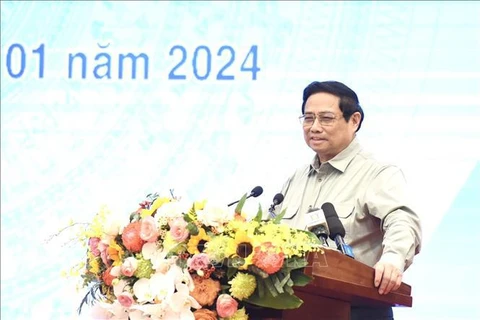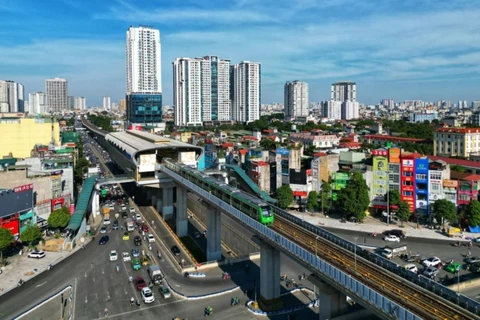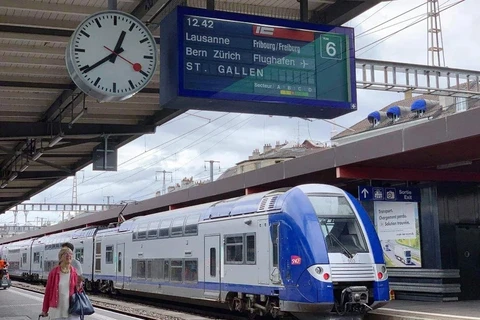Hanoi (VNS/VNA) - Private investors are expected to be gain interest in railway infrastructure development projects that have so far not had significant success in raising private capital.
The CT Group recently proposed that the Prime Minister approve investment of 9.98 billion USD to build a high-speed railway linking HCM City and the Mekong Delta’s Can Tho city. The railway line will stretch 174km and have 12 stations, passing through HCM City, Binh Duong, Long An, Tien Giang and Vinh Long provinces, and Can Tho city. It will be invested under the public-private partnership (PPP) form.
The CT Group is not the first private investor interested in railway infrastructure projects. In early 2018, Korea’s Lotte E&C applied for investment research in a project to upgrade the Yen Vien - Lao Cai railway and build another railway connecting Lao Cai - Ha Khau under the PPP method.
In March 2023, East Japan Railway Company also sent a document to the leaders of the Ministry of Transport expressing interest in a project to upgrade Hanoi- Hai Phong railway.
However, none of the above projects have made any progress on the ground, despite receiving active support from the Ministry of Transport.
In fact, unlike seaports, roads and aviation, investment in railway infrastructure in the form of PPP is always slow and receives little attention from private investors.
The biggest barrier in luring private investment in railway infrastructure development is that projects in this field need very large investment capital and offer low profits, leading to long payback periods.
In addition, incentive and support mechanisms for private investors have not yet been guided by competent agencies for implementation. Currently, there is still no specific guidance on the railway development mechanism according to the transit-oriented development (TOD) model, which integrates urban railway projects into real estate projects.
As the Politburo issued Conclusion 49-KL/TW, dated February 28, 2023, orientating the development of Việt Nam's railway transport to 2030 with a vision to 2045, experts suggested that management authorities need to boldly propose breakthrough legal mechanisms that are higher than normal legal regulations to solve the problem of resources for railway infrastructure development. In which, the top priority is to build specific mechanisms and policies to promote resources from the people and encourage investors to participate in TOD projects./.
The CT Group recently proposed that the Prime Minister approve investment of 9.98 billion USD to build a high-speed railway linking HCM City and the Mekong Delta’s Can Tho city. The railway line will stretch 174km and have 12 stations, passing through HCM City, Binh Duong, Long An, Tien Giang and Vinh Long provinces, and Can Tho city. It will be invested under the public-private partnership (PPP) form.
The CT Group is not the first private investor interested in railway infrastructure projects. In early 2018, Korea’s Lotte E&C applied for investment research in a project to upgrade the Yen Vien - Lao Cai railway and build another railway connecting Lao Cai - Ha Khau under the PPP method.
In March 2023, East Japan Railway Company also sent a document to the leaders of the Ministry of Transport expressing interest in a project to upgrade Hanoi- Hai Phong railway.
However, none of the above projects have made any progress on the ground, despite receiving active support from the Ministry of Transport.
In fact, unlike seaports, roads and aviation, investment in railway infrastructure in the form of PPP is always slow and receives little attention from private investors.
The biggest barrier in luring private investment in railway infrastructure development is that projects in this field need very large investment capital and offer low profits, leading to long payback periods.
In addition, incentive and support mechanisms for private investors have not yet been guided by competent agencies for implementation. Currently, there is still no specific guidance on the railway development mechanism according to the transit-oriented development (TOD) model, which integrates urban railway projects into real estate projects.
As the Politburo issued Conclusion 49-KL/TW, dated February 28, 2023, orientating the development of Việt Nam's railway transport to 2030 with a vision to 2045, experts suggested that management authorities need to boldly propose breakthrough legal mechanisms that are higher than normal legal regulations to solve the problem of resources for railway infrastructure development. In which, the top priority is to build specific mechanisms and policies to promote resources from the people and encourage investors to participate in TOD projects./.
VNA
























